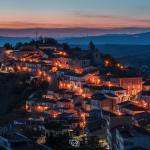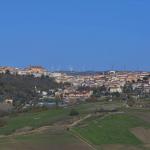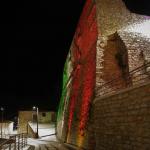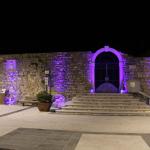The Municipality of Savignano Irpino is located within the area of the Cervaro-Miscano Valley. It's a village with 1,089 inhabitants, located 718 metres above sea level, at 72 km from Avellino. The territory extends for 38.47 sq km and the adjoining municipalities are: Ariano Irpino, Greci, Montaguto, Monteleone di Puglia and Panni.
The etymology of the name derives from the Latin name Sabinius which probably indicates an ancient landowner of the area, but its name changed in 1963 from Savignano di Puglia to Savignano Irpino, reflecting the border situation of the municipality. The inhabitants are called Savignanesi and Saint Anna and Saint Nicholas are their patron saints.
PLACES OF INTEREST
- Guevara Castle - Built between the 7th and 8th centuries, it once dominated the Cervaro Valley and, today, some remains of the original layout are still visible
- Mother Church of San Nicola e Sant’Anna (Saint Nicholas and Saint Anne)- Dating back to the 14th century, it has a Latin cross plan with a nave and two aisles
- Church of the Purgatory - Houses the 18th-century statue of the Immaculate Conception
- Church of the Madonna delle Grazie (Our Lady of Graces) - Of very ancient origin, the last restoration dates back to 1911
- Orsini Palace - Dating back to 1727 and built at the behest of Pope Benedict XIII
- Percorso Vita (Fitness Trail) - Recent naturalistic engineering project that allows one to carry out physical activity and excursions in the Cervaro Valley
- Angelica Fountain - Today’s ornamental fountain, in the past satisfied the need to obtain domestic water
- Tombola Belvedere - Overlooking the Cervaro Valley: from here one can admire a splendid panorama
- Aguglia Lake - Small artificial lake, stretching over 400 square metres and fed in part by the sulphurous water of the spring, but also by other freshwater springs
- Porta Lizza (Lizza Gate) - Located along the Via dei Finestroni, it is the oldest gate of the village
- Porta Grande (Great Gate) - Overlooks the main square and gives access to the medieval core of the historic centre
EVENTS
- Orecchiette Festival - Food and wine event that has taken place since 1977, held in August
- Savignanese Carnival - Folkloric event full of music and colours, takes place in the week of Shrove Tuesday
- Cicatielli and green beans Festival - Food and wine event with traditional dishes of Irpinia
- Savignanestate - Summer event of shows in the square that was born in the eighties and lasts from 28 July to 15 August
- Feast of Saint Anne - It occurs on 26 July and is the feast of the patron saint of Savignano Irpino, one of the most awaited events by both residents and emigrants from Savignano Irpino
TYPICAL FOOD AND PRODUCTS
- Orecchiette with ragù - Typical dish of the cuisine of Savignano, prepared with sauce and meat in small pieces
- Cicatielli e fagiolini - Artisan pasta with a green bean condiment and sometimes with tomato sauce
- Laganielle Fasul - First course based on lagane with beans
- Savignanese Breakfast - Traditional side dish, prepared with the combination of potatoes and fried green peppers
- Irpinia Colline dell’Ufita PDO - Extra virgin olive oil deriving largely from the Ravece variety, characterised by a pleasant bitter and spicy taste
- Caciocavallo Silano PDO - Semi-hard cheese, with spun curd, produced with milk from different breeds of cows, including Podolica
FUN FACTS
The Municipality of Savignano Irpino is part of the prestigious network of “Italy’s Most Beautiful Villages” since 2016.
It has a camper parking area consisting of 12 areas, which holds the quality recognition “Yellow Flag” assigned by A.C.T Italia (acronym of Associazione Campeggiatori Turistici d’Italia, an association for Campers).
HISTORICAL NOTES
The origins of Savignano Irpino are uncertain, although remains of the first settlements dating back to the Paleolithic era have been found at Ferrara and Monte Sant’Angelo: the discoveries made have allowed us to reconstruct the succession of different ethnic groups in the Cervaro Valley over the various eras. The birth of the current village could date back to the period between the 7th and 8th centuries, coinciding with the construction of the castle, built for defensive purposes.
During the Norman era, Savignano was affected by a fortification process that led it to be part of a barony dependent on the county of Ariano Irpino, together with Ferrara and the nearby Greci.
After the Unification of Italy in 1861, the town was incorporated into the province of Avellino and, a year later, assumed the specification “di Puglia”, to differentiate itself from municipalities of the same name, located in the provinces, respectively, of Modena (Savignano sul Panaro) and Forlì-Cesena (Savignano sul Rubicone). Only in 1963, the municipality changed the specification to “Irpino”.
The breath that becomes a fresh cloud, the gaze that is lost in the great spaces of the most rural Irpinia: wonderful in summer, enchanting in winter. Savignano Irpino welcomes visitors, allowing them to regain possession of their senses
Savignano Irpino
Corso Vittorio Emanuele, 8, 83030 Savignano Irpino AV, Italia
Did you like it? Leave a review
Your opinion is important! It will be visible after approval by the editorial staff.
To post a comment you must be an authenticated user. Log in with Social Login



